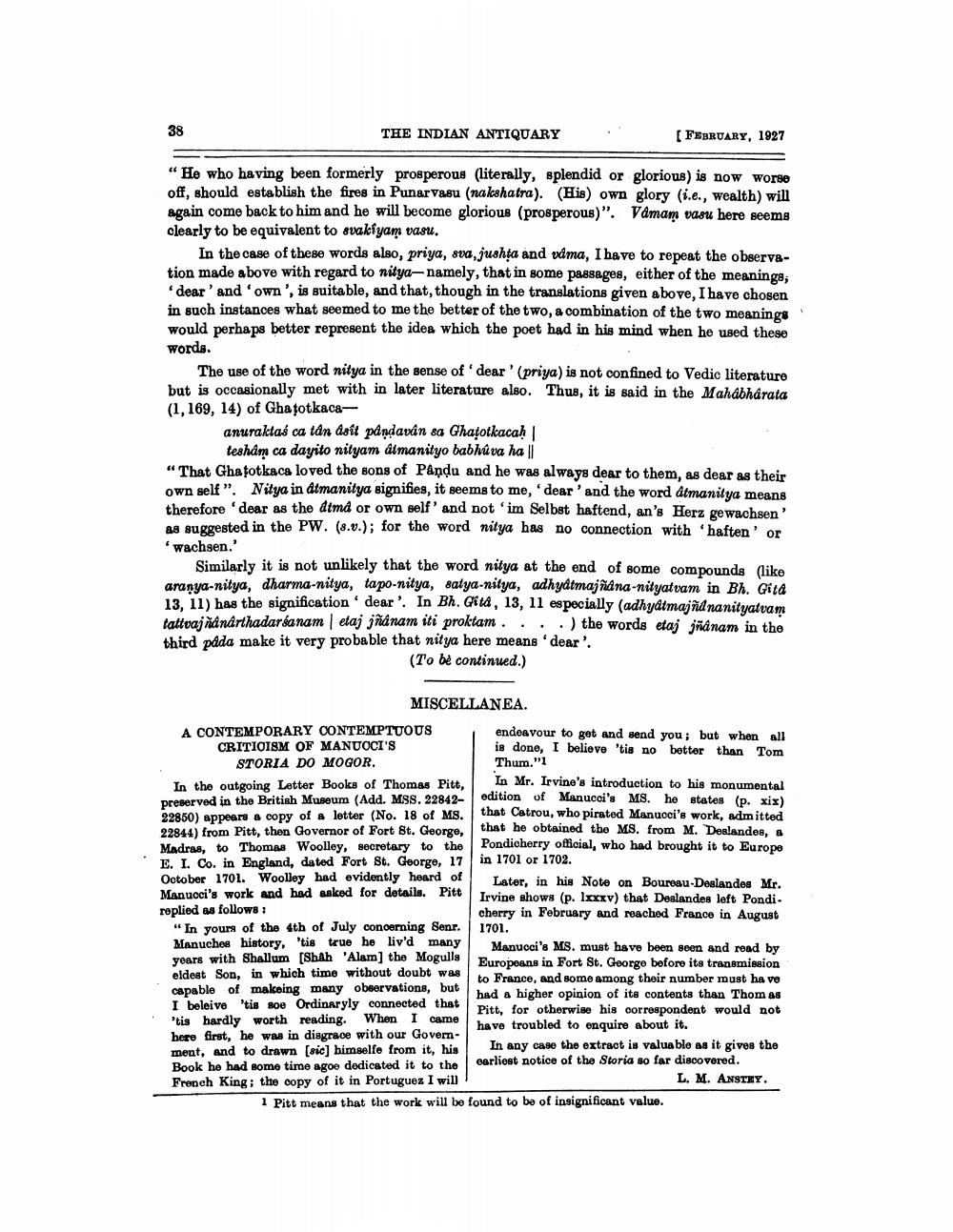________________
38
THE INDIAN ANTIQUARY
(FEBRUARY, 1927
“He who having been formerly prosperous (literally, splendid or glorious) is now worse off, should establish the fires in Punar Vasu (nakshatra). (His) own glory (i.e., wealth) will Again come back to him and he will become glorious (prosperous)". Vamam vasu here seems clearly to be equivalent to svakiyam vasu.
In the case of these words also, priya, sva, jushta and udma, I have to repeat the observation made above with regard to nitya-- namely, that in some passages, either of the meanings,
dear' and 'own', is suitable, and that, though in the translations given above, I have chosen in such instances what seemed to me the better of the two, a combination of the two meaninge would perhaps better represent the idea which the poet had in his mind when he used these words.
The use of the word nitya in the sense of 'dear' (priya) is not confined to Vedic literature but is occasionally met with in later literature also. Thus, it is said in the Mahabharata (1,169, 14) of Ghatotkaca
anuraktaś ca tan asit pandaván sa Ghatotkacah |
tesham ca dayito nityam dimanityo babhú va ha || « That Ghatotkaca loved the sons of Pandu and he was always dear to them, as dear as their own self". Nitya in dtmanitya signifies, it seems to me, 'dear and the word dtmanitya means therefore 'dear as the atmd or own self' and not im Selbst haftend, an's Herz gewachsen' ng guggested in the PW. (8.v.); for the word nitya has no connection with 'haften' or wachsen.'
Similarly it is not unlikely that the word nitya at the end of some compounds like aranya-nitya, dharma-nitya, tapo-nitya, satya-nitya, adhydtmajnana-nityatvam in Bh. Gita 13. 11) has the signification' dear'. In Bh. Gita, 13, 11 especially (adhyatmajñd nanityatvam tattvai va narthadarsanam | etaj jñanam iti proktam ....) the words etaj jadnam in the third pada make it very probable that nitya here means 'dear'.
(To be continued.)
MISCELLANEA. A CONTEMPORARY CONTEMPTUOUS
endeavour to get and send you; but when all CRITICISM OF MANUOCI'S
is done, I believe 'tis no better than Tom STORIA DO MOGOR.
Thum."1 In the outgoing Letter Books of Thomas Pitt,
In Mr. Irvine's introduction to his monumental preserved in the British Museum (Add. MSS. 22842- edition of Manucci's MS. he states (p. xix) 22850) appears a copy of a letter (No. 18 of MS. that Catrou, who pirated Manucci's work, admitted 22844) from Pitt, then Governor of Fort St. George,
that he obtained the MS. from M. Deslandes, & Madras, to Thomas Woolley, secretary to the Pondicherry official, who had brought it to Europe E. I. Co. in England, dated Fort St. George, 17 in 1701 or 1702. October 1701. Woolley had evidently heard of
Later, in his Note on Boureau-Deslandes Mr. Manucci's work and had asked for details. Pitt
Irvine shows (p. lxxxv) that Deslandes left Pondi. replied as follows:
cherry in February and reached France in August " In yours of the 4th of July concerning Senr.
1701. Manuches history, 'tis true he liv'd many
Manucci's MS. must have been seen and read by years with Shallum (Shah 'Alam] the Mogulls
Europeans in Fort St. George before its transmission eldest Son, in which time without doubt was
to France, and some among their number must have capable of making many observations, but
had a higher opinion of its contents than Thomas I beleive 'tis soe Ordinaryly connected that
Pitt, for otherwise his correspondent would not tis hardly worth reading. When I came
have troubled to enquire about it. here first, he was in diagrace with our Government, and to drawn [sic] himselfe from it, his
In any case the extract is valuable as it gives the Book he had some time agoe dedicated it to the
carliost notice of the Storia so far discovered. French King; the copy of it in Portuguez I will
L. M. ANSTRY. 1 Pitt means that the work will be found to be of insignificant value.




